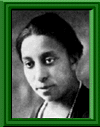Lucy Diggs Slowe


Lucy Diggs Slowe was born in Berryville, Virginia, the youngest child
of Henry Slowe, a hotel proprietor, and Fannie Porter Slowe. Her father died
when she was nine months old. After her mother's death in 1890, Lucy went to
live with her paternal aunt, Mrs. Martha Price, in Lexington, Virginia.
Three years later the family moved to Baltimore where she attended the public
elementary and high schools.
In 1904, she became the first woman graduate of the Baltimore Colored
High School to enter Howard University. She was also the first graduate from
her high school to receive a college scholarship. To supplement her meager
finances, she worked her way through Howard University with summer employment
as a clerk. She continued to live in Baltimore and commuted daily to
Washington.
At Howard, Ms. Slowe was a very industrious student and would rise
early in the morning to study before classes. She was so well thought of by
the faculty and by her peers, that during her senior year she was trusted to
chaperone the Miner Hall girls in the reception room and on downtown shopping
tours.
Ms. Slowe was active in many facets of undergraduate life. She sang
as a contralto with the university choir, was president of the Women's Tennis
Club, vice president and secretary of the Alpha Phi Literary Society, and was
a staunch supporter of the intercollegiate debating team.
Ms. Slowe was an active and enthusiastic member of the founding group
of Alpha Kappa Alpha. Her assignment was to prepare the first draft of the
constitution, and the document finally adopted was developed from her draft
by Margaret Flagg, Lavinia Norman and Ethel Hedgeman. it stipulated that the
president of the sorority must be a senior, so Miss Slowe was elected the
first president of Alpha Kappa Alpha. After she received the Bachelor of
Arts degree in 1908, she taught at the Douglass High School in Baltimore for
seven years. During that period, she did graduate work at Columbia
University and received the master's degree in 1915. From 1915 to 1919, she
taught at Armstrong High School in the District of Columbia and served one
year as dean of girls. The quality of her work was soon recognized. In
September 1919, Ms. Slowe was requested by the board of education to organize
the first junior high school in the District of Columbia. She was appointed
principal of this school, Shaw junior School, and served in that position
until June 1922.
In 1922, Ms. Slowe became the first dean of women at Howard
University, a position she held until her death in 1937. In her new position,
Ms. Slowe immediately established contact with the offices of deans of women
at other major universities, and studied their procedures and adapted them to
the needs of Howard. She was helped by Dr. Romiett Stevens of Columbia
University who had developed the first course for deans of women in the
United States. Ms. Slowe maintained close ties with Columbia for the rest of
her life and often delivered lectures at that university.
The responsibilities of her position were varied. In addition to her duties
as educational advisor on women's affairs, she was responsible for the
housing of students and for seeking funding sources and (or) employment.
She assisted in the organization and execution of student government and
helped plan community liaison projects. One of the principal accomplishments
as dean of women was to persuade the board of trustees to establish the
women's campus on Fourth Street. Ms. Slowe also inaugurated the famous
Christian Vesper service at Howard and the Women's Dinner in the fall. In
addition to her responsibilities as dean of women, Ms. Slowe was a professor
in the department of English.
Ms. Slowe served Alpha Kappa Alpha to the extent proper for her
position. Her efficiency and organizational skills became evident through
her many activities as a nationally known educator, lecturer and
administrator. She organized the National Association of College Women and
served as its president for several years. She founded the Association of
Advisors to Women in Colored Schools and she was affiliated with and served
as president of the College Alumnae Club of Washington.
She was well aware of the importance of interracial communication and
was counselor to the Race Relations Group of the North American Home Missions
of the National Student Council and served on committees of the national
board of the YWCA.
A visionary, Ms. Slowe began in 1933 emphasizing the importance of
education for all women and advising that Black women, in particular, study
economics and government so as to have the necessary knowledge to improve the
social conditions of all Black people.
Recognition of the exceptional career of Ms. Slowe was part of the
program of the 70th anniversary convention of the National Association of
Women Deans, Administrators and Counselors in 1986. A plaque honoring Lucy
Diggs Slowe, America's first Black dean of women and first Black member of
the National Association of Women Deans, Administrators and Counselors is
displayed in the organization's headquarters in Washington, D.C. Dr. Lucille
Piggott, retired dean of students at North Carolina Agricultural and
Technical College, was responsible for the presentation.
Lucy Diggs Slowe died on October 21, 1937 after an illness of two
months. Two buildings located in Washington, D.C. have been named for her:
the Lucy Diggs Slowe Hall of Howard University and the Lucy Diggs Slowe
Elementary School.